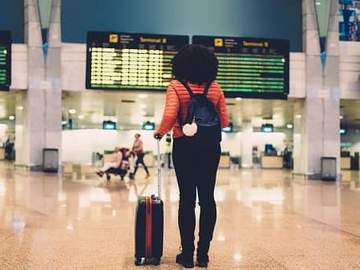When it comes to the verb “travel,” you might have noticed something peculiar. Sometimes it’s spelled with a single “l” – traveling – and other times with a double “l” – travelling. Is one right and the other wrong? Are you making a spelling mistake without even realizing it?
 A traveler checks the departure board at an airport, highlighting the global nature of travel and variations in traveling spelling.
A traveler checks the departure board at an airport, highlighting the global nature of travel and variations in traveling spelling.
The answer, like many things in the English language, depends on where you are. This difference in traveling spelling boils down to a fascinating divergence between American English and the English used in pretty much the rest of the world.
The Great Divide: US vs. The Rest of the World
If you’re in the United States, you’re most likely to see and use traveled and traveling. These single “l” spellings are the standard in American English. However, venture outside the US, particularly to the UK, Australia, and other Commonwealth countries, and you’ll encounter travelled and travelling much more frequently. Both sets of spellings are correct within their respective regions. Neither is inherently wrong. It’s simply a matter of geographical preference in spelling.
Noah Webster: The Spelling Reformer Behind the Single “L”
This spelling variation can largely be attributed to Noah Webster, an American lexicographer who is considered the father of American dictionaries. In the late 18th and early 19th centuries, Webster championed spelling reform as a way to make American English distinct and, in his view, more logical than British English. He believed in simplifying spellings, and one of his reforms was to drop the extra “l” in words like travel when adding suffixes like “-ed” and “-ing.” This is why, in American English, we have traveling, traveled, and also canceled instead of cancelling and cancelled.
When Does American English Keep the Double “L”?
Interestingly, Webster’s reforms weren’t a blanket removal of all double “l”s. American English does retain the double “l” in words where the stress or emphasis falls on the syllable right before the suffix. Think of words like expelled, expelling, controlled, and controlling. In these cases, the accent is on the second syllable (-pel and -trol), so the double “l” remains in both American and British English.
In conclusion, when pondering traveling spelling, remember there’s no single right answer globally. If you’re writing for a US audience, traveling and traveled are the way to go. For a broader international audience, or specifically a British English speaking one, travelling and travelled are perfectly acceptable and often preferred. Both forms are a testament to the rich and evolving nature of the English language and its fascinating regional variations.
